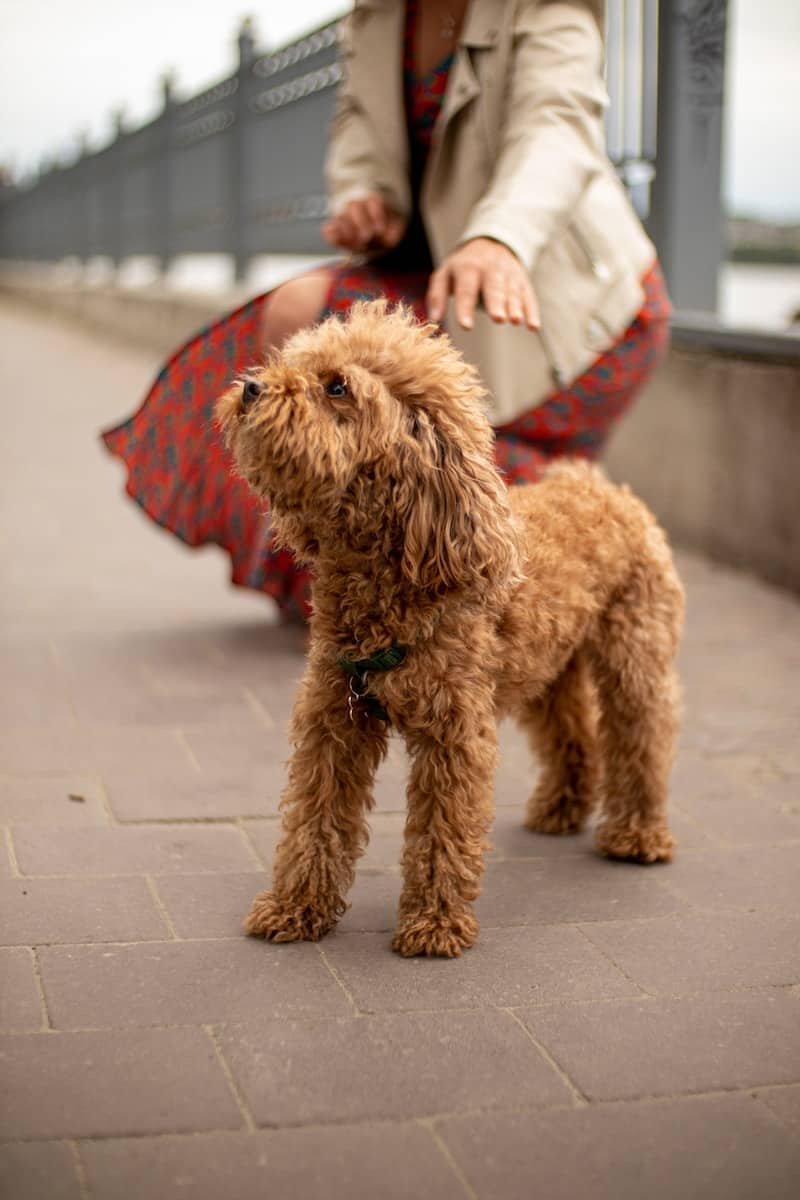Caring for a special needs poodle can be a rewarding and fulfilling experience, but it also comes with its own set of unique challenges. Poodles are highly intelligent and trainable dogs that make excellent companions, but they also require a lot of attention and care. When you add in the additional needs of a special needs poodle, it can be a lot to handle.
Understanding poodles and their physical traits and characteristics is important when caring for a special needs poodle. Poodles are known for their hypoallergenic coats, which require regular grooming to maintain. They are also prone to certain health issues such as hip dysplasia and eye problems. When caring for a special needs poodle, it is important to be aware of their specific needs and limitations, and to provide them with the care and attention they require.
Key Takeaways:
- Caring for a special needs poodle can be rewarding but also challenging.
- Understanding poodles and their physical traits and characteristics is important when caring for a special needs poodle.
- Providing a special needs poodle with the care and attention they require is crucial for their well-being.
Understanding Poodles
Poodles are a popular breed known for their intelligence, elegance, and affectionate nature. Originally bred in Germany and France, poodles were used as water retrievers and were highly valued for their ability to swim. Today, poodles come in three sizes: standard, miniature, and toy, and are recognized by the American Kennel Club as a distinct breed.
Poodle breed development has been carefully managed over the years, resulting in a breed with unique characteristics. They are highly trainable and excel in obedience competitions. Poodles are also hypoallergenic, making them a popular choice for people with allergies. They have a curly, non-shedding coat that requires regular grooming to prevent matting.
The Poodle Club of America is the official AKC parent club for the breed, and they provide information on breed standards, health concerns, and events. Poodle enthusiasts can find a wealth of information on the club’s website, including breeder referrals and rescue resources.
When caring for a poodle, it’s important to understand their specific needs. They require regular exercise and mental stimulation to prevent boredom and destructive behavior. Poodles are prone to separation anxiety, so it’s important to socialize them early and provide plenty of attention and companionship.
In summary, understanding the unique characteristics of poodles is key to providing them with the best possible care. Whether you are considering adding a poodle to your family or already have one, taking the time to learn about their breed-specific needs will help ensure a happy and healthy life together.
Physical Traits and Characteristics
Caring for a special needs poodle can be a rewarding experience, but it’s important to understand the physical traits and characteristics of this breed. Poodles are known for their curly, hypoallergenic coats and come in a variety of sizes and colors. In this section, we’ll discuss the size and coat of poodles, as well as their color and lifespan.
Size and Coat
Poodles come in three different sizes: standard, miniature, and toy. Standard poodles can weigh anywhere from 45 to 70 pounds and stand at least 15 inches tall at the shoulder. Miniature poodles weigh between 12 and 20 pounds and stand between 10 and 15 inches tall. Toy poodles are the smallest, weighing in at just 4 to 6 pounds and standing no taller than 10 inches.
All poodles have curly coats that are hypoallergenic and shed very little. This makes them a great choice for people with allergies or those who don’t want to deal with a lot of pet hair. However, their coats do require regular grooming to prevent matting and tangling. Poodles should be brushed at least once a week and trimmed every six to eight weeks to keep their coats looking neat and tidy.
Color and Lifespan
Poodles come in a variety of colors, including black, white, brown, gray, and apricot. Some poodles have parti-color coats, which means they have two or more colors. Poodles can also have different shades of the same color, such as silver or cafe au lait.
The lifespan of a poodle depends on its size. Standard poodles typically live for 10 to 14 years, while miniature and toy poodles can live for up to 18 years. It’s important to keep your poodle healthy by providing regular vet check-ups, a balanced diet, and plenty of exercise.
In conclusion, poodles are a unique breed with many physical traits and characteristics that make them a great choice for pet owners. Understanding their size, coat, color, and lifespan is important when caring for a special needs poodle. With proper care and attention, your poodle can live a long, happy life.
Caring for a Special Needs Poodle
Owning a special needs poodle can be a challenging and rewarding experience. As a responsible pet owner, it is important to understand the unique requirements of these beloved pets to ensure they live happy and healthy lives. In this section, we will discuss the essential aspects of caring for a special needs poodle, including diet and nutrition, exercise needs, and grooming and maintenance.
Diet and Nutrition
A balanced diet is essential for maintaining the health of a special needs poodle. It is important to provide your furry friend with high-quality dog food that meets their specific nutritional requirements. A diet that is rich in protein, animal proteins, and omega-3 fatty acids can help maintain healthy skin, coat, and overall well-being.
To maintain a healthy weight, it is recommended to feed your poodle a premium dry food that is rich in protein. You can also include wet food in their diet, but it should not exceed more than 25% of their daily intake. Additionally, you should avoid feeding your poodle table scraps, as it can lead to obesity and other health issues.
Exercise Needs
Regular exercise is crucial for the physical and mental well-being of your special needs poodle. Daily exercise, such as walking, is essential to maintain their health. You can also engage your furry friend in various canine sports, such as agility trials and hide-and-seek, to provide them with mental stimulation and physical exercise.
It is important to note that the exercise needs of a special needs poodle may vary depending on their condition. Consult with your veterinarian to determine the appropriate exercise regimen for your furry friend.
Grooming and Maintenance
Proper grooming and maintenance are essential for the health and well-being of your special needs poodle. Regular grooming can prevent matting and tangling of their fur, which can lead to skin irritation and other health issues.
It is recommended to trim your poodle’s hair every six to eight weeks to maintain their appearance and prevent matting. Additionally, regular brushing and bathing can help keep their coat clean and healthy.
In conclusion, caring for a special needs poodle requires attention to their unique requirements, including diet and nutrition, exercise needs, and grooming and maintenance. By providing your furry friend with the care they need, you can enjoy a happy and healthy life together.
Training a Special Needs Poodle
As a poodle owner, training your furry friend is a crucial part of ensuring they lead a happy and healthy life. When caring for a special needs poodle, there are certain considerations that must be taken into account to ensure they receive the best care and training possible.
Socialization and Obedience
Socialization is key for any dog, but it is especially important for a special needs poodle. These dogs require extra patience and care when it comes to socialization and obedience training. It is important to expose your poodle to a variety of people, places, and situations from a young age to help them become well-adjusted and confident.
Positive reinforcement is an effective training technique for poodles with special needs. Rewarding good behavior with treats or praise can help your poodle learn faster and retain what they have learned. It is important to be patient and consistent with training, as it may take longer for a special needs poodle to learn certain skills.
Special Skills and Activities
Poodles are intelligent and easy to train, making them great candidates for special skills and activities. Tracking, hunting, and agility training are just a few examples of activities that poodles excel at. However, when caring for a special needs poodle, it is important to take their individual needs into account and modify training techniques accordingly.
In addition to physical activities, mental stimulation is also important for poodles with special needs. Puzzle toys, interactive games, and obedience training can all provide mental stimulation and help your poodle stay engaged and happy.
Training a special needs poodle can be a rewarding experience for both you and your furry friend. With patience, positive reinforcement, and a willingness to modify training techniques, you can help your poodle reach their full potential and live a happy, healthy life.
Health Challenges and Care
Caring for a special needs poodle can be a rewarding experience, but it also comes with its own set of unique challenges. It is important to be aware of common health issues that poodles may face and to have a plan in place to provide the best care possible. In this section, we will discuss common health challenges and how to care for your special needs poodle.
Common Health Issues
Blindness, anxiety, separation anxiety, allergies, arthritis, bacteria, progressive retinal atrophy, patellar luxation, limping, ear infections, plaque, tracheal collapse, trachea, von Willebrand’s disease, and overweight are all common health issues that poodles may face. It is important to be aware of these issues and to have a plan in place to manage them.
Blindness can be caused by progressive retinal atrophy, which is a genetic condition that causes the retina to degenerate over time. Symptoms include difficulty seeing in low light, bumping into objects, and dilated pupils. Anxiety and separation anxiety can be caused by a variety of factors, including genetics, environment, and past experiences. Symptoms include excessive barking, destructive behavior, and pacing.
Allergies can cause a variety of symptoms, including itching, redness, and swelling. Arthritis is a condition that causes inflammation in the joints, which can cause pain and stiffness. Bacteria can cause a variety of infections, including ear infections, which can cause discomfort and hearing loss. Patellar luxation is a condition that causes the kneecap to dislocate, which can cause limping and pain. Tracheal collapse is a condition that causes the trachea to narrow, which can cause difficulty breathing.
Insurance and Support
Pet insurance can provide peace of mind and financial support when caring for a special needs poodle. It is important to research different insurance providers and plans to find one that meets your needs. Some insurance plans may cover pre-existing conditions, while others may not. It is also important to have a support system in place, including access to resources and support groups. These resources can provide information, advice, and emotional support when caring for a special needs poodle.
In conclusion, caring for a special needs poodle can be challenging, but with the right care and support, it can also be a rewarding experience. It is important to be aware of common health issues and to have a plan in place to manage them. Pet insurance and support groups can provide additional resources and support when caring for a special needs poodle. By providing the best care possible, you can ensure that your special needs poodle has a happy and healthy life.
Adopting a Special Needs Poodle
Adopting a special needs poodle can be a rewarding experience, but it also comes with unique challenges. Here are some things to consider before bringing a special needs poodle into your home.
Rescue and Adoption
There are many rescue organizations that specialize in poodles with special needs, such as deaf or blind dogs, or those with three legs. Adopting a rescue poodle not only gives you the opportunity to provide a loving home for a dog in need, but it can also be a deeply rewarding experience.
Choosing the Right Poodle
When choosing a special needs poodle, it’s important to consider their age, personality, and temperament. Some poodles may require more attention or training than others, so it’s important to choose a dog that fits your lifestyle and level of experience.
Preparing Your Home
Before bringing your special needs poodle home, it’s important to prepare your home to accommodate their needs. This may include making modifications to your home, such as installing ramps or non-slip flooring. You may also need to purchase specialized equipment, such as a wheelchair or harness.
Overall, adopting a special needs poodle can be a unique and rewarding experience. With the right preparation and care, you can provide a loving home for a dog in need and enjoy the many joys of caring for a special needs pet.
Frequently Asked Questions
If you’re considering adopting or have already adopted a special needs poodle, you likely have many questions about how to care for them. Here are some frequently asked questions and answers to help you provide the best possible care for your furry friend.
How do you care for a dog with special needs?
Caring for a special needs poodle requires extra attention and care. Depending on their specific needs, they may require specialized diets, medications, or equipment to help them move around. It’s important to work closely with a veterinarian who specializes in caring for special needs dogs to ensure they receive the appropriate care and treatment.
What are some common challenges when caring for a special needs dog?
Caring for a special needs poodle can be challenging, but it’s also incredibly rewarding. Some common challenges include managing their behavior, ensuring they get enough exercise, and finding the right veterinarian to provide specialized care. It’s important to stay patient and persistent, and to seek out support from other pet owners and professionals if needed.
What are some strategies for managing a special needs dog’s behavior?
Managing a special needs poodle’s behavior can be challenging, but there are several strategies that can help. Positive reinforcement training can be effective in reinforcing good behavior, while ignoring or redirecting unwanted behavior can help discourage it. It’s important to remain consistent and patient, and to work closely with a veterinarian or animal behaviorist to develop an effective behavior management plan.
How can you ensure your special needs dog gets enough exercise?
Ensuring your special needs poodle gets enough exercise is crucial for their physical and mental health. However, depending on their specific needs, they may require modified exercise routines or specialized equipment to help them move around. Working closely with a veterinarian or physical therapist can help you develop an exercise plan that is safe and effective for your furry friend.
What are some tips for finding a veterinarian who specializes in caring for special needs dogs?
Finding a veterinarian who specializes in caring for special needs dogs can be challenging, but it’s important to work with someone who has experience and expertise in this area. You can start by asking for recommendations from other pet owners, or by searching for veterinarians who specialize in caring for special needs pets online. It’s important to ask questions and ensure the veterinarian has the necessary qualifications and experience to provide the care your poodle needs.
What are some resources available for owners of special needs dogs?
There are many resources available for owners of special needs dogs, including online communities, support groups, and specialized pet care providers. These resources can provide valuable information, support, and advice for caring for your furry friend. It’s important to take advantage of these resources and to seek out support and guidance whenever you need it.



